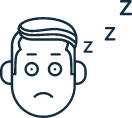
If you live in a town or city, then the rumble of traffic noise might wake you earlier than you’d like. In most urban areas, the morning’s peak traffic starts at about 7:00 am. If you live in a more rural area, birdsong might have disturbed your sleep a couple of hours ago.

























